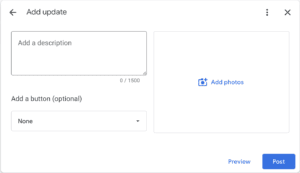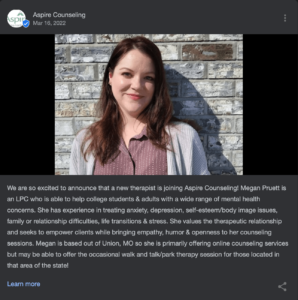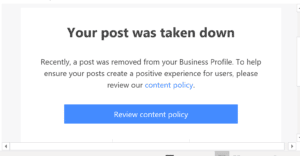Resource Guide: Photo Alt Text and Title Examples + Inclusive Resources for Photos
I have been very passionate for a while on creating impactful and effective alt text, alt titles, and having inclusive and accurately representative photos. Truly, I really hate looking at a website that has stereotypical and offensive photos that don’t accurately depict people’s struggles, needs, and identity. I know it can be hard to find the right photos at times, but we still have a duty to create content on our websites that allow clients to see themselves and their experiences.
Photo Alt Text, Optimizing Photos, & Titles Examples
Within couples therapy websites there are so many keywords you can use. This is an example of how I would formulate photo text in general. The general format I am looking at is as follows:
Photo Alt Title: Short description of the photo ( *not denoting anything related to mental health) | Keyword | Keyword | Keyword | Zip Code | Zip Code | Zip Code
Know that you can do 3-5 zip codes and keywords. Make sure not to over optimize or keyword stuff.
Photo Alt Text: Semi-longer photo description ( *not denoting mental health). Sentence with keyword about struggle. A sentence with keyword establishing hope. Sentence with keyword establishing next steps.
*When it comes to some websites, their policies include making sure not to negatively attribute the photo or the person in the photo to some “negative” mental health stigma. This is the rules of some websites, not necessarily ours, so make sure to read the fine print when you are getting paid or free photos from sites.
Couples Therapy Website
Alt Title: Couple holding on to each other noses touching | Marriage Counseling and Couples Therapy in Chicago, IL | EFT therapy | Relationship Therapist | 60602 |60603 |60604
Alt Text: A couple with noses touching embracing while in love. Marriage counseling and couples therapy in Chicago, IL is not a place where relationships go to die. Working with a relationship therapist means you care and want to work on your relationship. Connect emotionally once again in EFT therapy in Illinois today!

Child and Teen Therapist
Photo Alt Title: Child curled up into a ball | Child Therapist in Florida | Teen Therapist in Tampa | Therapy for Teens | Child Therapy | 33614 | 33619 | 33610
Photo Alt Text: Child curled up into a ball with parent comforting them. You never want to see your child hurting. Maybe you’ve tried child therapy or therapy for teens in Tampa, Fl before and felt it wasn’t helpful, but with the right child therapist or teen therapist, it can be. We encourage you to reach out soon!

Addiction Treatment Center
Alt Title: Disabled father hugging daughter | Substance Abuse Therapy | Substance Abuse Counseling in Los Angeles, CA | Drug Abuse Counselor | 90040 | 90058 | 90201 | 90220
Alt Text: Father in wheelchair hugging smiling daughter in yellow. Our Drug abuse and addictions counselors understand how hard substance abuse is to overcome alone. Substance abuse counseling in Los Angles, CA doesn’t need to be a lonely journey. Let our team help you in substance abuse therapy soon!

Private Medical Practice
Photo Alt Title: Client talking to medical professional | Pain Doctor in Denver, CO| Pain Management Doctors | Chronic Illness Management | 80001 | 80002 | 80003
Photo Alt Text: Woman in black sweater and pink hair talking with doctor on laptop. A pain doctor in Denver, CO can help you with pain and chronic illness management. Our pain management doctors are some of the best in their field. Call now and get support.

Speech and Language Pathologist
Alt Title: A man with his hands up in the air | Speech Therapist in Westchester, NY | SLP Therapy | Speech Therapist for Adults |10701 |10801 | 10573
Alt Text: Man with his hands up in the air. We all communicate differently, and sometimes with need a speech therapist for adults in Westchester, NY. You are not alone! SLP therapy is meant to help you connect again and feel safe in how you communicate. Start working with a speech therapist in New York today!

Dietician
Photo Alt Title: Man in the background with plant | Medical nutrition therapy | Registered Dietician in Austin, Texas | Nutrition Therapy | 78613 | 78610 | 78613
Photo Alt Text: Plant in foreground and black man in the background. Our team of registered dieticians in Austin, Texas can help you navigate nutritional concerns, eating disordered, health concerns, and more. We offer nutrition therapy and medical nutrition therapy in Texas both in-person or online.

Eating Disorder Therapist
Alt Title: Woman feeling distress from chocolate on table | eating disorder therapist in Atlanta, GA| binge eating therapy | anorexia treatment | bulimia treatment | 30002 (Avondale Estates) | 30021 (Clarkston) | 30030 (City of Decatur)
Alt Text: Woman with chocolates on table and hands in head distressed. Sometimes we struggle to manage food and body on our own. An eating disorder therapist in Atlanta, GA who offers eating disorder therapy, anorexia treatment, and bulimia treatment can help. Call now and book a free consultation.
One great website you can use is alt text generator. It doesn’t add in keywords, but if you struggle to come up with the initial photo description, this is a good resource.
Photo Sites and Their Algorithm
One issue that really gets under my skin is how algorithms on websites are created. For example, when I am trying to find natural curly hair or hair routines on Pinterest, usually what happens is that people who look nothing like me show up. Typing in natural on a site often alludes to POC, but algorithms are often white washed by the majority.
So imagine creating a therapy website where photos “appear” diverse enough, but actually don’t show the realistic side of some ones experience. Likewise, if you are an ED therapist and all your photos show angry plus sized people or a black woman eating a salad, or stereotypical person “overeating” photos, that often stigmatized and adds to the stereotype.
One problem with the algorithm is often in order to find representative photos, you have to type in offensive or rude texts in order to find the right content. Honestly, as a therapist that infuriates me. Plus, if you as a mental health professional have a deeper attachment to the issues you work with that can also be triggering to you.
So, how do we get inclusive and representative photos without having work with the algorithm on certain sites? I have created a list of websites that you can use for finding photos that are more inclusive and real.
Where and How to Find Representative, Inclusive, and Diverse Photos ( Free + Paid)
Open AI
This is a great resource if you want to have AI create your photos. Coming up with descriptions for this is hit or miss, but its a great up and coming option.
https://openai.com/product/dall-e-2 25 free photos per month
Creative Market
If you like a mix of cartoon animations and site aesthetics, this is a great option. The photos are affordable for a set and once you purchase a commercial license the content can be used in many areas.
https://creativemarket.com/ArtOlB/5946532-CURVY-GIRLS-FLOWERS-LINE-ART
Tonl
This is a paid service, but has a group of wonderfully diverse photos. The categories are based on topics like trust, tradition, tone, and travel, among others.
Gender Spectrum Vice
Let’s face it, finding photos that accurately represent the LGBTQIA+ community are sparse, this is a free site that offers many different options for you to add to your site.
https://genderspectrum.vice.com/
Nappy
Finding diversity in photos for black and BIPOC individuals is complicated. Luckily nappy is working to make this more accessible.
Iwaria
Black and African culture are not the same, therefore, if you work with African clients, this site is for you. Likewise, being nationally and internationally inclusive is necessary for any clinician.
Big Stock Photos
This is a site the Simplified SEO Consulting using personally and for our Done for you clients. Now, I will admit, it does take a specific strategy to find the photos you need without being stereotypical or stigmatizing. I often say, don’t search for the thing you are looking for and you will find what you need.
So if I type in native women, I am likely to get tribal representations, however if I type in business woman ethic, or indigenous, or sometime similar it will narrow the results. Its unfortunately we have to find what we need inversely, but it is possible.
https://www.bigstockphoto.com/
Flickr (Women in Tech)
Looking for fierce women in tech of all ethnicities, races, religions, and so on? You have found the right site.
https://www.flickr.com/photos/wocintechchat/
CreateHERStock
This is a paid service with some options for freebies ( which is currently being updated). If you are looking for more representative photos of men, non-binary, and women. Then this is for you.
Wrap Up on Private Practice SEO
You are responsible for allowing clients to see themselves in your website message, photos, and design. User experience and design play a big role on our brand. Try your hands at photo descriptions. Be intentional about the descriptions, and check out these resources, especially if you are struggling to find sites that represent your ideal clients.
Learn How to Begin Optimizing Photos, Descriptions and Choose Inclusive Photos with Our Webinar!
We are hosting a webinar on April 7th for Alt Text and Diversity. We’d love to have you attend. You can also purchase the recording from our website afterwards. In the meantime, if you want support with your SEO, our team of experts will work with you every step of the way. Simplified SEO Consulting can help you begin developing content and best practices for your online and in-person presence. So don’t let confusion stop you from having an effective website – contact us today by following these simple steps:
- Apply to work with our team
- Once approved schedule your 45-minute consultation
- Learn about our team!
- Start adding intentional photos and alt text to your site.
Other Services At Simplified SEO Consulting
If you’re looking for other forms of support, we can help! We offer options such as our 12-week training, small group intensives, and courses. Our strategy session can be a great option if you need support getting started with SEO or doing a site move or redesign. Or, if you’re ready to work with a passionate and skilled team, our Done for You Program may be a great following approach.
About the Author
Jasmine is the SEO Training Coordinator and offers free consultations for Simplified’s SEO Consulting on our services. Jasmine is a Clinical Mental Health Counselor and recently earned her degree from Northwestern University. She works to help people with a strategy with national rankings, eating disorder specialties, trauma, sports psychology, postpartum/pregnancy/parenting, high achievers, and much more. Schedule a consult soon!







 One of these strategies that has been around for a while is known as
One of these strategies that has been around for a while is known as  Finally, it is also worth noting that not all directories are credible. You never want to pay for something that will promise you a large number of high quality backlinks. This could be seen as a
Finally, it is also worth noting that not all directories are credible. You never want to pay for something that will promise you a large number of high quality backlinks. This could be seen as a 

 Be Sure You’re Optimizing Readability
Be Sure You’re Optimizing Readability








 Putting each of these pieces together to create effective SEO-focused Google Business Profile updates is easier said than done. But, with time and practice, the process can be a fun and fulfilling way to make the most of updates to your practice. It is also worth stating that linking back to the specific blog or page you’re referring to is a very important part of the process! Make it as easiest as possible for people to reach your site. Doing so will go a long way in helping your practice get discovered on a local level. For most posts, you will likely want to choose the “learn more” button even though it is optional. This will allow you to include the link to the specific page on your site you want to go.
Putting each of these pieces together to create effective SEO-focused Google Business Profile updates is easier said than done. But, with time and practice, the process can be a fun and fulfilling way to make the most of updates to your practice. It is also worth stating that linking back to the specific blog or page you’re referring to is a very important part of the process! Make it as easiest as possible for people to reach your site. Doing so will go a long way in helping your practice get discovered on a local level. For most posts, you will likely want to choose the “learn more” button even though it is optional. This will allow you to include the link to the specific page on your site you want to go.





